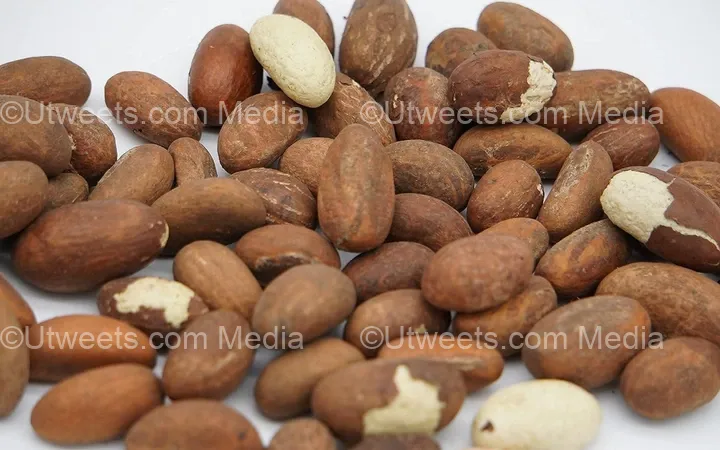One of the most familiar sayings is “An apple a day keeps the doctor away.” However, recent research suggests that bitter kola could be a strong contender for safeguarding against various diseases, including benign prostate enlargement. ...READ THE FULL STORY FROM SOURCE ...READ THE FULL STORY FROM SOURCE
According to a new study, bitter kola, due to its kolaviron content, may offer protection against inflammation and oxidative stress, which are factors associated with the development of benign prostate…
enlargement, also known as benign prostatic hyperplasia (BPH).
The researchers conducted experiments to investigate the impact of kolaviron on induced BPH in rats. They observed that it led to a reversal in the proliferation of prostate cells and significantly reduced prostate weight, prostate index, and levels of certain hormones and substances in the body that contribute to an enlarged prostate gland.
The prostate index is an FDA-approved blood test used to assist in differentiating between prostate cancer and benign prostatic conditions. It evaluates the severity of BPH symptoms.
The prostate is a part of the male reproductive system, responsible for producing fluid for semen. About the size of a walnut, it is located below the bladder and in front of the rectum, surrounding a tube called the urethra, through which urine passes.
Benign prostatic hyperplasia occurs when the prostate and surrounding tissue expand, and it is the most common benign tumor found in men. It leads to symptoms by obstructing the flow of urine from the bladder through the urethra. Symptoms related to BPH affect approximately one in four men by age 55 and half of men aged 75.
Men at a higher risk include those over the age of 50, individuals with fathers who have BPH, overweight or obese men, those who lead sedentary lifestyles, and men with erectile dysfunction.
Until recently, surgery was the primary treatment option, but there have been recent approvals for minimally invasive procedures that open the prostatic urethra and drugs that can alleviate symptoms either by reducing the size of the prostate or by relaxing the prostate muscle tissue that narrows the urethra.
However, drug side effects such as dizziness, headache, erectile dysfunction, and loss of libido have limited the effectiveness of these treatments. Consequently, there is a strong need for alternative treatments involving natural products with minimal or no toxicity that are readily available, accessible, and potent in combating BPH.
This study, which suggests that bitter kola may disrupt the processes underlying the abnormal growth of the prostate, thus preventing benign prostate enlargement in rats under laboratory conditions, was published in the journal Inflammopharmacology. The study was conducted by Ebenezer O. Farombi, Babajide O. Ajayi, Edward K. Opata, Abisoye O. Fafioye, and Adetomilola T. Akinade, all affiliated with the Department of Biochemistry at the College of Medicine at the University of Ibadan.
Another established benefit of consuming bitter kola is its blood pressure-lowering effect. In a study published in the March edition of Natural Product Communications, researchers found that increased consumption of bitter kola by individuals taking the antihypertensive drug Lisinopril resulted in a significant reduction in blood pressure. Lisinopril is a conventional drug used to regulate blood pressure.
In animal studies, they discovered that the combination of kolaviron (an extract of bitter kola) and lisinopril led to significant reductions in blood pressure. This included up to a 27 percent reduction in systolic blood pressure, a 24 percent reduction in diastolic blood pressure, and a 22 percent reduction in mean arterial pressure.
The researchers induced hypertension in Wistar rats and treated them with kolaviron and lisinopril for 28 days, after which blood pressure was measured. Additionally, the vital organs and blood of the animals were collected for analysis.
Previously, Cameroonian researchers conducted a single-center, single-arm non-randomized clinical trial suggesting that bitter kola supplementation in individuals with high normal or grade 1 hypertension is safe and significantly reduces their blood pressure.
Grade 1 hypertension is defined as having a systolic blood pressure of 140 to 159 mmHg and/or a diastolic blood pressure of 90 to 99 mmHg.
The trial involved 25 adult patients with high normal blood pressure or grade 1 hypertension who were newly diagnosed and not previously treated with any antihypertensive treatment at the Yaoundé Central Hospital (YCH) between January and May 2019. They consumed two seeds (each weighing 10 grams) of bitter kola every morning before breakfast and were followed up for 30 days.
The median systolic blood pressure decreased from 136 mmHg to 123 mmHg, while the diastolic blood pressure decreased from 84 mmHg to 76 mmHg at Day 30. No serious adverse effects were observed. This was reported in the 2021 edition of the Journal of Integrative Cardiology.
“This trial opens the way for further studies, which can lead to a large-scale use of this medicinal plant for the treatment of high blood pressure in countries where there is limited access to high-cost modern drugs,” they added.




